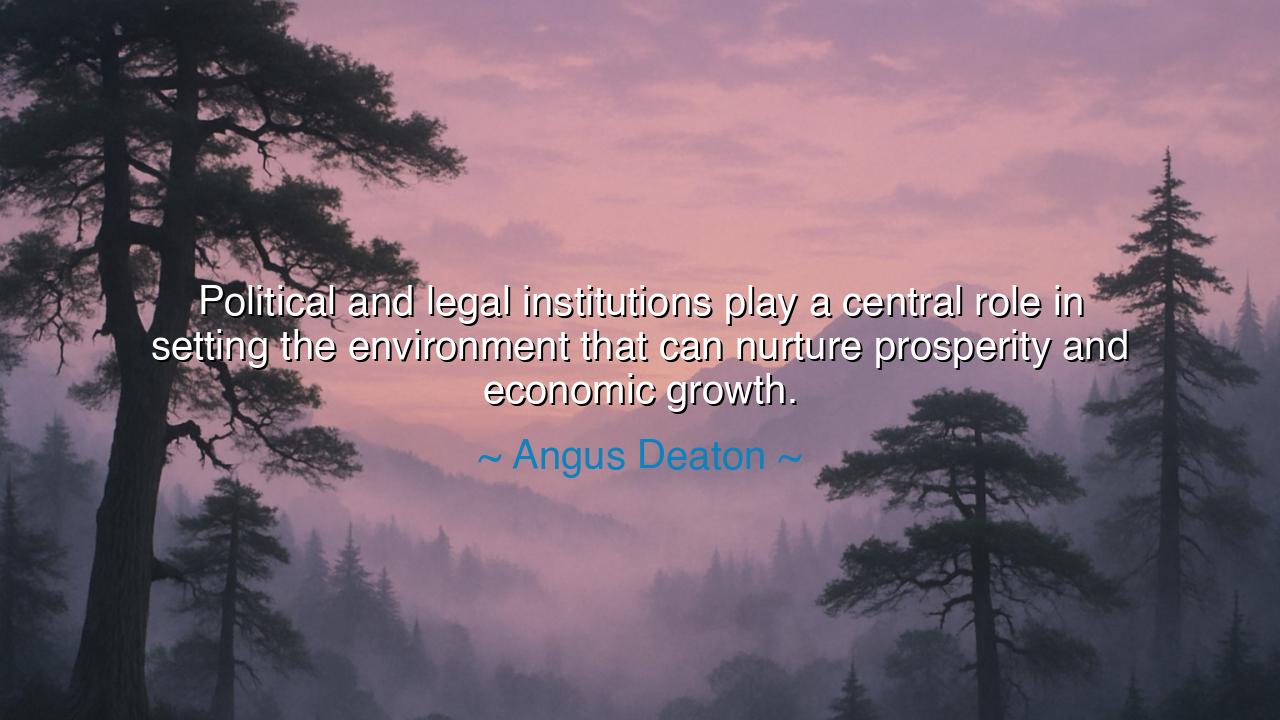
Political and legal institutions play a central role in setting
Political and legal institutions play a central role in setting the environment that can nurture prosperity and economic growth.






When Angus Deaton proclaimed, “Political and legal institutions play a central role in setting the environment that can nurture prosperity and economic growth,” he spoke with the wisdom of one who has gazed deeply into the heart of nations. His words carry the solemn truth that the wealth of a people is not born from chance or greed, but from the strength of their foundations — the laws that govern them and the justice that sustains them. In every civilization, from the dawn of empires to the rise of modern states, prosperity has never been the fruit of chaos but of order — not of tyranny, but of trust. Deaton reminds us that before a nation can flourish in gold or grain, it must first flourish in governance.
In the style of the ancients, such words would be spoken as counsel to kings and rulers. For the old philosophers knew that a society’s fortune is rooted not in its fields or its markets, but in the character of its institutions. The wise emperor Ashoka of India, after conquering through war, discovered that true greatness comes not from conquest but from justice. He built an empire not on fear, but on fair governance, establishing laws and councils that honored all faiths and protected the weak. His rule became a golden age — proof that when law and virtue align, a nation prospers in both spirit and substance. So too does Deaton call us to remember that the greatness of a people lies not in what they possess, but in how they govern what they possess.
The origin of this quote arises from Deaton’s long study of development economics, where he explored why some nations thrive while others remain mired in poverty. Through decades of research, he found that material wealth alone cannot sustain growth — that roads, factories, and trade mean little when a nation’s laws are corrupt, when courts are unjust, or when political power serves the few over the many. Prosperity, he teaches, is not merely economic — it is moral and institutional. The laws that protect property, the courts that ensure fairness, the governments that uphold transparency — these are the unseen pillars upon which all true progress rests.
History echoes his insight. Consider the fate of Rome, the mightiest empire of the ancient world. In its early years, Rome prospered because its institutions — the Senate, the courts, the civic assemblies — balanced power and upheld accountability. The rule of law was sacred, binding even the consul and the general. But as corruption crept in, as emperors ruled by decree and justice was sold to the highest bidder, the empire’s body remained vast while its spirit decayed. Trade faltered, trust vanished, and the empire crumbled beneath the weight of its own injustice. Deaton’s words, though modern, carry this ancient lesson: that no nation can stand long on wealth alone — it must rest upon the foundation of fair and functioning institutions.
Yet, his message is not one of despair, but of renewal. For if institutions can decay, they can also be rebuilt. Nations have risen from ashes when they restored the covenant between power and the people. After the devastation of World War II, Japan and Germany rebuilt their societies not merely with money, but with new constitutions, new courts, and systems rooted in fairness, transparency, and accountability. Within a generation, both nations emerged as beacons of prosperity — a testament to Deaton’s truth that when political and legal systems honor justice, economic growth follows like a shadow to light.
In the tone of the ancients, we may say this: the law is the skeleton of civilization, and politics is its beating heart. When they work together in harmony, the body of society stands upright and strong. But when corruption poisons the blood, or injustice weakens the bones, the whole body falters and falls. Prosperity is not a gift of fortune — it is the consequence of fairness. A nation that wishes to prosper must therefore cultivate the soil of justice and water it with integrity, so that the tree of abundance may take root and bear fruit for all.
The lesson of Deaton’s words is both profound and practical. Let those who lead remember: it is not wealth that creates justice, but justice that creates wealth. Let every citizen understand: a prosperous nation begins not in palaces, but in principles — in the daily defense of honesty, equality, and lawful order. When we protect truth, when we demand fairness, when we strengthen the institutions that serve all and not the few, we build prosperity not just for ourselves, but for generations yet unborn.
So let these words endure as teaching for the ages: that law and governance are the twin guardians of civilization’s destiny. Where they are pure, nations thrive; where they are corrupt, nations perish. And if every man and woman, from ruler to worker, commits to uphold the integrity of the system that binds them, then prosperity will not be fleeting — it will be the steady, eternal rhythm of a people in harmony with justice.






AAdministratorAdministrator
Welcome, honored guests. Please leave a comment, we will respond soon